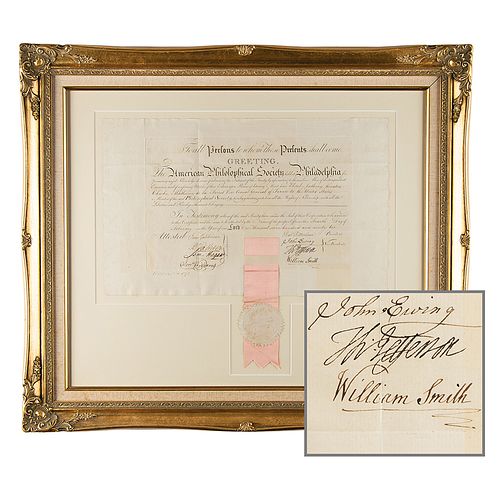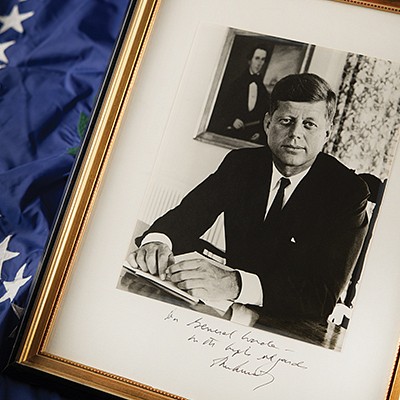Thomas Jefferson Signed American Philosophical Society Certificate
Two ways to bid:
- Leave a max absentee bid and the platform will bid on your behalf up to your maximum bid during the live auction.
- Bid live during the auction and your bids will be submitted real-time to the auctioneer.
Bid Increments
| Price | Bid Increment |
|---|---|
| $0 | $5 |
| $50 | $10 |
| $200 | $25 |
| $500 | $50 |
About Auction
May 15, 2024
Boasting nearly 800 lots, RR Auction's May Fine Autographs and Artifacts sale is highlighted by a section honoring the anniversary of President John F. Kennedy's birth—including important signed photographs, a remarkable Kennedy family-signed book, a knife used to slice his inaugural cake, a page from his pioneering Peace Corps legislation, and scarce teletype reports on his assassination. RR Auction support@rrauction.com
- Lot Description
Beautiful partly-printed DS, signed “Th: Jefferson,” one page, 19 x 11.75, February 4, 1792. American Philosophical Society membership certificate issued to “Charles Mathurin de la Forest, Vice Consul General of France to the United States,” boldly signed at the conclusion by Thomas Jefferson, David Rittenhouse, John Ewing, William Smith, James Hutchinson, Robert Patterson, Samuel Magaw, Jonathan Williams. The certificate retains its pink ribbon with affixed white embossed seal of the society. Beautifully mounted, matted, and framed to an overall size of 29.5 x 25.5.
On the frame's reverse is a window containing an ALS by Jonathan Williams, countersigned by James Hutchinson, one page both sides, 8.5 x 7.25, January 25, 1792, notifying de la Forest of his election as a member. In full: "We have the pleasure to inform you that on the 20th Inst. the American Philosophical Society added your name to their list of Members.—The principles of this Institution embrace all nations, and while the Society endeavors to add their mite to the common cause of humanity, they fondly hope to experience from distinguished Characters of other places, Such communications as may tend to diffuse that philosophical Light, which so eminently shines in the Country you represent. Your certificate of membership will be made out as soon as possible, in the meantime we could not delay the pleasure we feel in making this communication." In fine to very fine condition, with intersecting folds and exceptionally bold, ideal signatures.
The oldest extant learned society of its kind in the United States, the American Philosophical Society was founded in 1743 by Benjamin Franklin, for 'prompting useful knowledge among British plantations in America.' The Society's first three presidents were Benjamin Franklin, David Rittenhouse, and Thomas Jefferson. Among its notable early members were Thomas Paine, George Washington, John Adams, John Marshall, James Madison, and others.
Antoine René Charles Mathurin, comte de Laforêt [La Forest] (1756-1846) was a senior French diplomat and among the early international electees to the Society's ranks. During the American Revolution, in 1779, he was named Secretary to the French legation in the United States, then Vice-Consul at Savannah, Philadelphia and New York. He was made Consul-General of France in the United States in 1788. As a consul, Laforet authored reports analyzing the U.S. Constitution and the likelihood of its ratification. After returning to France in 1793, Mathurin served in various diplomatic and political roles, including a brief period as Minister of Foreign Affairs during the transitional government after the fall of Napoleon in 1814.
In addition to Jefferson, the other notable signers include:
James Hutchinson (1752-1793), a Revolutionary War patriot, physician, and surgeon, as well as Benjamin Franklin's messenger of important dispatches in Europe. A trustee of the University of Pennsylvania from 1779 until his death, he was elected chairman of the department of chemistry in 1791.
Robert Patterson (1743-1824) was a renowned patriot, Revolutionary War surgeon and professor of mathematics at the University of Pennsylvania from 1779-1814, later becoming that institution's Vice-Provost. In 1805, President Thomas Jefferson appointed him Director of the U.S. Mint. Active in the American Philosophical Society, he was elected its President in 1819 and held this office until his death five years later.
Samuel Magaw (1740-1812) was a member of the first class of the University of Pennsylvania, and, from 1782-1791, Vice-Provost of his alma mater. An educator and missionary, Magaw was honored in 1784 as a principal organizer in the early movements of the Protestant Episcopal Church of the United States by Bishop William White, the First Bishop of Pennsylvania.
Jonathan Williams (1750-1815), Benjamin Franklin's grand-nephew, served as the elder statesman's Secretary during his tenure as United States Ambassador in France in 1773. Williams later became Superintendent of West Point at President Jefferson's request in 1805, and was elected to Congress in 1814, but died prior to taking his seat.
David Rittenhouse (1732-1796) was the second president of the American Philosophical Society. Best known for his pioneering work in astronomy, he reputedly constructed the first telescope in the United States. Rittenhouse was a highly esteemed surveyor, and oversaw the establishment of state boundaries in the Northeast, New England, and Northwest Territories. He served as Pennsylvania's Treasurer from 1777 to 1789, and in 1792 President George Washington appointed him as the first director of the U.S. Mint, a position he held for three years. Rittenhouse was chosen as a Fellow of the Royal Society of London in 1795. He served as President of the American Philosophical Society until his death.
John Ewing (1732-1802) was provost of the University of Pennsylvania from 1779 until his death. A mathematician and scientist, Ewing assisted David Rittenhouse in surveying the boundaries of several states.
Clergyman William Smith (1727-1803) was the founding director of the seminary in Philadelphia, which subsequently became the University of Pennsylvania. Smith founded Washington College in 1782, and was its first president. - Shipping Info
-
Bidder is liable for shipping and handling and providing accurate information as to shipping or delivery locations and arranging for such. RR Auction is unable to combine purchases from other auctions or affiliates into one package for shipping purposes. Lots won will be shipped in a commercially reasonable time after payment in good funds for the merchandise and the shipping fees are received or credit extended, except when third-party shipment occurs. Bidder agrees that service and handling charges related to shipping items which are not pre-paid may be charged to a credit card on file with RR Auction. Successful international Bidders shall provide written shipping instructions, including specified Customs declarations, to RR Auction for any lots to be delivered outside of the United States. NOTE: Declaration value shall be the item’(s) hammer price and RR Auction shall use the correct harmonized code for the lot. Domestic Bidders on lots designated for third-party shipment must designate the common carrier, accept risk of loss, and prepay shipping costs.
-
- Buyer's Premium



 EUR
EUR CAD
CAD AUD
AUD GBP
GBP MXN
MXN HKD
HKD CNY
CNY MYR
MYR SEK
SEK SGD
SGD CHF
CHF THB
THB










